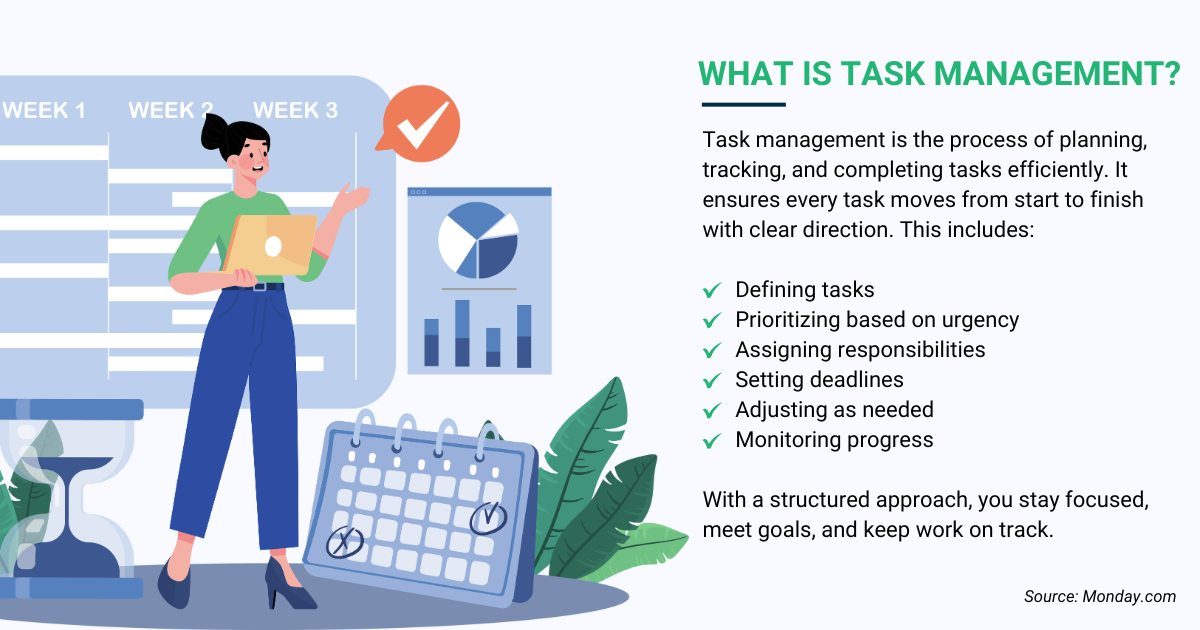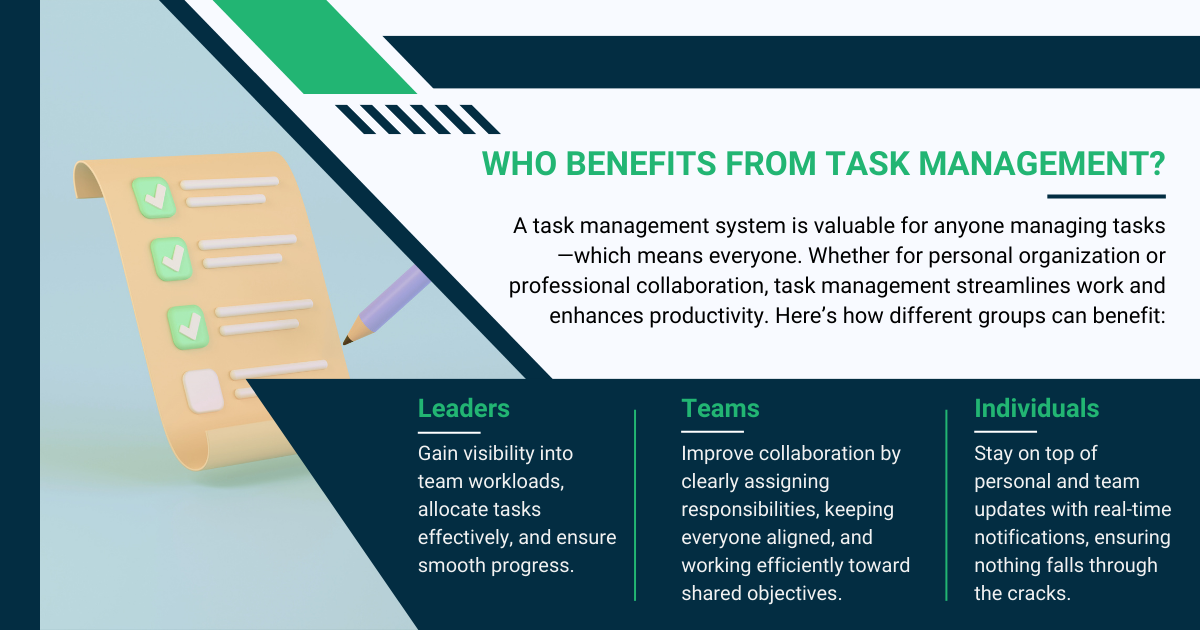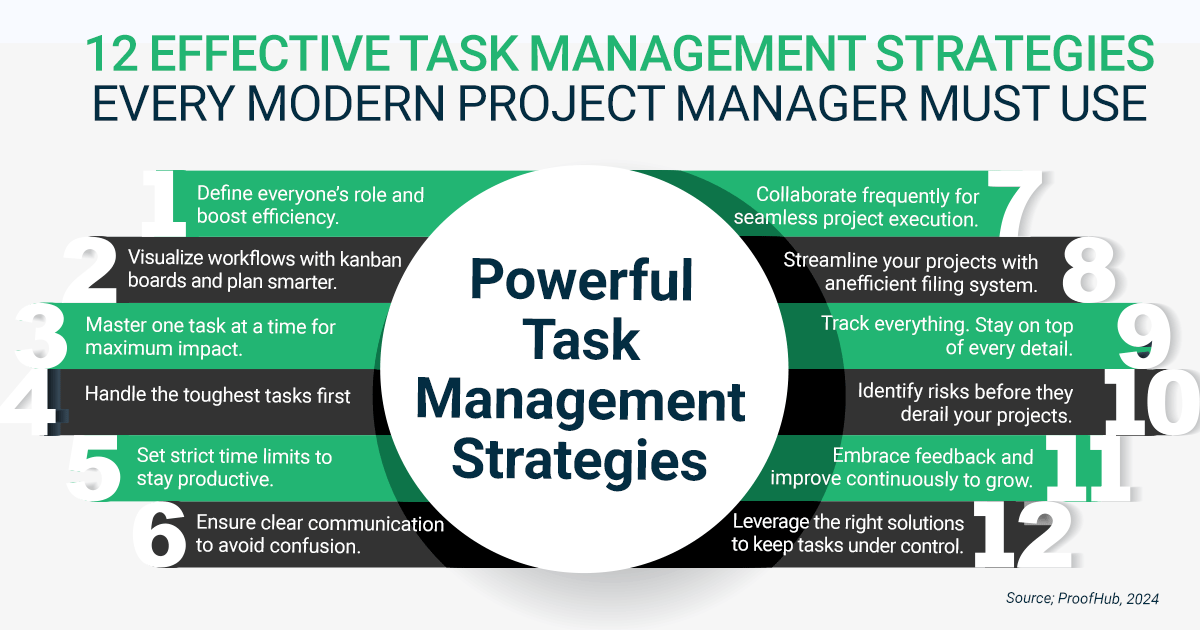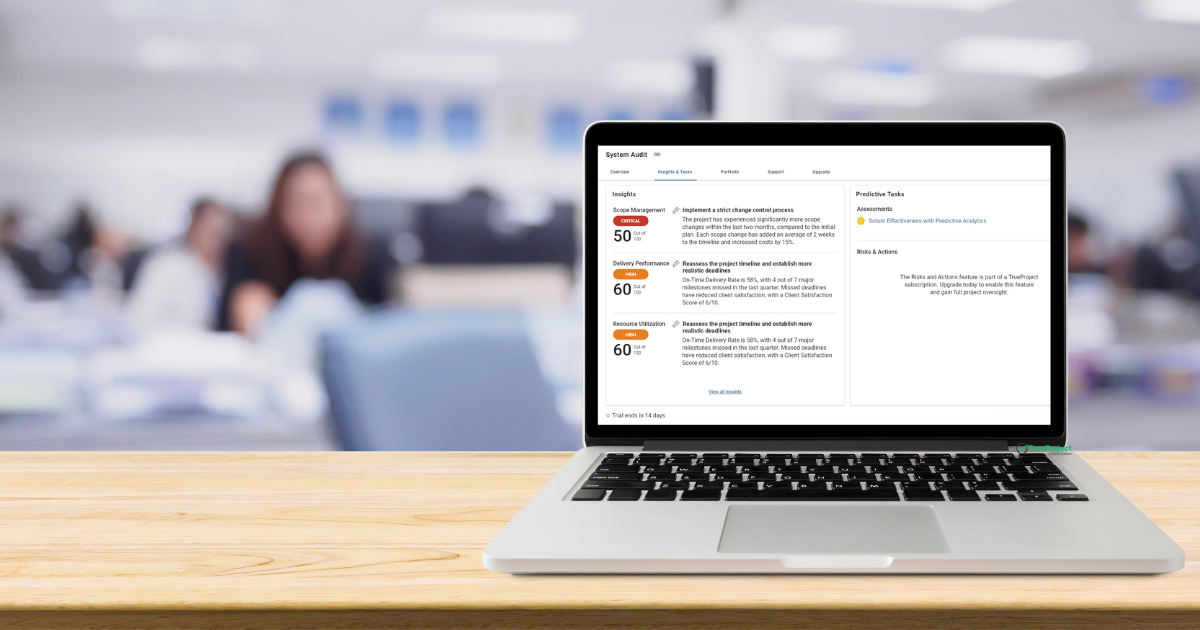
Did you know that 83% of U.S. workers face daily work-related stress, with 39% blaming their overwhelming workload (according to the American Institute of Stress)? Poor task management is often at the root of this chaos, leading to missed deadlines, burnout, and failed projects. In fact, 37% of executives in PMI’s 2017 survey pointed to unclear objectives and poor project discipline as key reasons for project failures. The days of relying on sticky notes, memory, or scattered spreadsheets are over.
Effective task management is the key to staying organized and focused. It ensures you’re always on top of your priorities, reducing stress and boosting productivity. Even the most organized businesses can spiral into chaos without a solid task management approach. In today’s fast-paced market, staying on top of deadlines, priorities, and progress is essential. A reliable task management framework ensures your team knows what needs to be done, when, and by whom, keeping everyone aligned and productive.
However, the modern workplace demands visibility, accountability, and real-time adaptability—things traditional task management approaches often lack. Without automation and insights, teams react to issues instead of preventing them, leading to constant firefighting and inefficiency.
Integrating predictive intelligence into your task management framework provides real-time insights, highlighting bottlenecks, flagging potential issues, and recommending the best action. This proactive approach minimizes surprises, keeps projects on track, and empowers your teams to work smarter, not harder. With the right strategies and solutions, you can transform how you handle tasks and optimize your workday.
In this article, we’ll explore the evolution of task management in modern projects, the rise of AI and predictive intelligence, and why task management needs predictive insights for project success. Task management isn’t just a process—it’s the foundation of productivity, and with the right intelligence, it becomes a strategic advantage.
Traditional approaches leave teams reacting to problems. TrueProject’s predictive intelligence gives you real-time visibility, identifies risks early, and keeps projects on course. Discover more here.

From Manual Tracking to Intelligent Task Management
Task management has come a long way. What started as scribbled notes and endless email threads have transformed into digital solutions that predict risks before they happen. The shift isn’t just about efficiency—it’s about making smarter decisions faster.
But how exactly has task management evolved? Let’s compare traditional methods to digital approaches and understand why modern solutions are game-changers.
Traditional vs. Digital Task Management: The Shift Toward Efficiency
For years, managing tasks meant scribbling notes, updating spreadsheets, or juggling endless to-do lists. While these methods worked somewhat, they came with serious limitations—lack of visibility, no real-time updates, and the constant risk of tasks slipping through the cracks.
The Limitations of Traditional Task Management
Manual task management often leads to the following:
- Scattered Information – Tasks get lost in notebooks, emails, and sticky notes, making tracking a nightmare.
- Time-Consuming Updates – Spreadsheets require constant manual updates, frustrating teams with outdated information.
- Lack of Accountability – Without clear ownership and tracking, deadlines get missed, and projects stall.
- No Collaboration – Traditional methods don’t support real-time teamwork, forcing teams to rely on lengthy email threads and status meetings.
As businesses scale and workflows become more complex, traditional methods fall short. The next logical step? Digital task management solutions that optimize workflows and ensure seamless execution. Digital solutions do more than organize tasks; they help teams work smarter, faster, and with greater precision.

Why Digital Task Management Works Better
Projects grow in complexity, and so do the challenges of managing them. Remote work, cross-functional teams, and tight deadlines demand more than static to-do lists. Teams need flexibility, real-time insights, and automation to stay in control. Modern task management approaches have redefined productivity. They centralize workflows, streamline communication, and provide real-time visibility into progress. They eliminate guesswork by:
- Offering Centralized Access – Every task, deadline, and update is available in one place, reducing confusion.
- Automating Workflows – Recurring tasks, reminders, and notifications ensure nothing falls through the cracks.
- Enhancing Collaboration – Team members can assign tasks, add comments, and track progress without endless back-and-forth communication.
- Providing Data-Driven Insights – Advanced reporting highlights bottlenecks and helps teams adjust strategies for maximum efficiency.
Beyond tools and automation, successful task management is dependent on strategy. The following infographic highlights 12 effective task management strategies every modern project manager must use to streamline workflows and drive efficiency.

While these strategies improve task execution, the real transformation happens when organizations embrace predictive intelligence—a concept we will explore in detail later in this article. The shift from traditional to digital task management is all about transforming how teams work. Digital task management has already transformed how teams collaborate, automate workflows, and track progress. But is that enough to make a project or a business initiative truly successful?
No, it’s not—because most businesses fail to recognize the difference between efficient task management and successful project management. They are not the same. While task management ensures that individual activities get done, project management is about guiding the entire initiative toward strategic goals. The real challenge lies in bridging the gap between execution and success. That’s where the next evolution of technology steps in—predicting outcomes, mitigating risks, and keeping projects on track before problems arise.
Static task lists aren’t enough. TrueProject gives you real-time visibility into project risks and bottlenecks—so you can act before issues derail success. Contact us to learn more.
Task Management vs. Project Management: Understanding the Difference
While managing individual tasks is crucial, execution can become disjointed without a broader project strategy. Task management and project management serve different purposes, and understanding their distinction is key to driving success.
- The Role of Task Management: Task management focuses on execution at a granular level—who does what and when. It ensures assignments are tracked, deadlines are met, and teams remain productive. However, it lacks the oversight needed to align with larger project objectives.
- The Role of Project Management: Project management ties tasks together, ensuring that every effort contributes to the overall goal. It involves planning, monitoring KPIs, managing resources, and mitigating risks to achieve successful outcomes.
To prevent disconnected execution, you must integrate task and project management strategically. This is where AI-powered project management solutions create a significant impact.
AI-Driven Project Management Approach: From Tracking to Predicting
The AI-driven project management solution revolutionizes project execution by analyzing patterns, detecting risks, and delivering predictive insights before issues escalate. This shift from reactive to proactive management minimizes surprises and empowers teams with greater control over outcomes.
Take KPI-driven analytics, for example. Instead of relying on assumptions, AI evaluates key performance indicators in real time. It flags potential delays, highlights resource constraints, and suggests corrective actions before minor setbacks become major roadblocks.
With predictive intelligence, task management moves beyond routine tracking. It helps teams anticipate challenges, optimize efficiency, and make informed decisions backed by real-time data. The result? Smoother execution, fewer disruptions, and a more confident approach to project success. Additionally, you gain a clear view of multiple initiatives simultaneously. If a project risks falling behind, automated alerts notify the right people, enabling quick action to keep timelines on track. Addressing issues early can prevent delays, ensure timely deliverables, and strengthen overall project outcomes.
But how can organizations effectively implement the AI-driven project management solution? Let’s explore key strategies for optimizing efficiency.
Tracking tasks isn’t enough. You need predictive insights that help you anticipate risks, optimize workflows, and keep projects on course. TrueProject offers real-time analytics and proactive alerts—so you can make informed decisions before issues arise. Ready to take control of your projects? Contact us to learn more.
Start Predicting: The AI-Powered Edge Beyond Task Management
In today’s high-stakes business environment, the difference between success and failure often depends on how effectively you drive projects forward. Ignoring inefficiencies, relying on outdated methods, or simply reacting to problems as they arise is no longer an option. The modern workplace demands more—real-time visibility, proactive decision-making, and automation that keeps projects moving forward. This is where an AI-driven solution, like TrueProject, a KPI-based predictive project management SaaS solution that improves project health and performance, steps in.
TrueProject integrates seamlessly with your task management tools, providing real-time and comprehensive insights into sprint burndown, scope changes, and work completion, instantly giving you a complete overview of your project's progress. But it goes beyond tracking—it combines system data with human sentiment, offering a comprehensive view of project health. By analyzing structured data and stakeholder feedback, TrueProject eliminates guesswork, proactively identifies risks, and ensures every effort aligns with strategic goals.

The future of task management isn’t about working harder but working smarter. Businesses that fail to adapt will continue firefighting, while those that embrace intelligent solutions will drive efficiency, reduce stress, and deliver projects with precision. The question is no longer whether you need a robust task management system—but whether you’re ready to outpace the competition with a more advanced predictive intelligence system that supercharges your task management solutions to deliver seamless execution, proactive risk mitigation, and unmatched project success.
See how TrueProject turbocharges your task management system with AI-driven insights, real-time visibility, and risk prevention. Watch the on-demand demo now.






